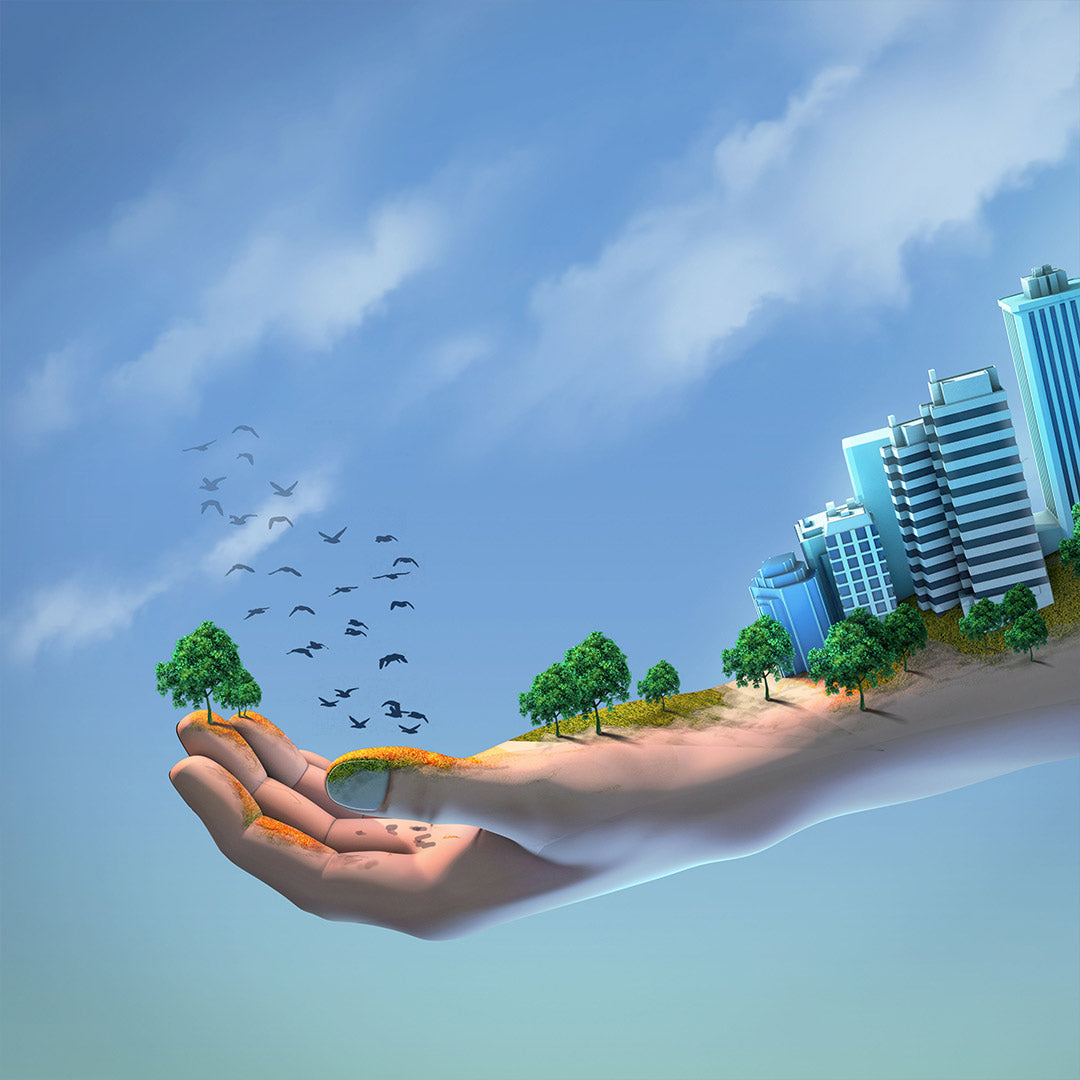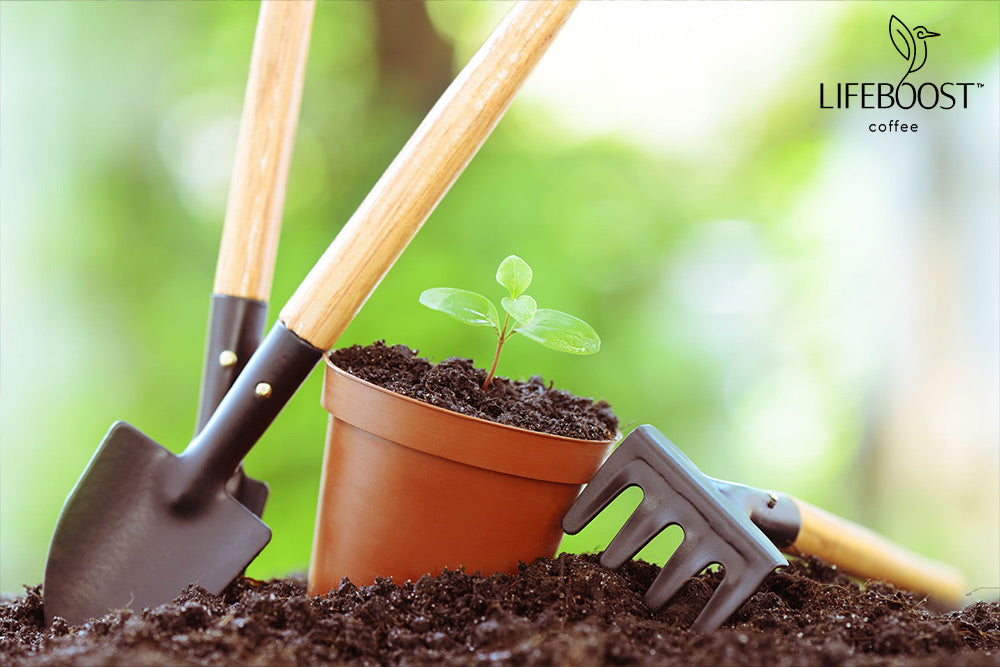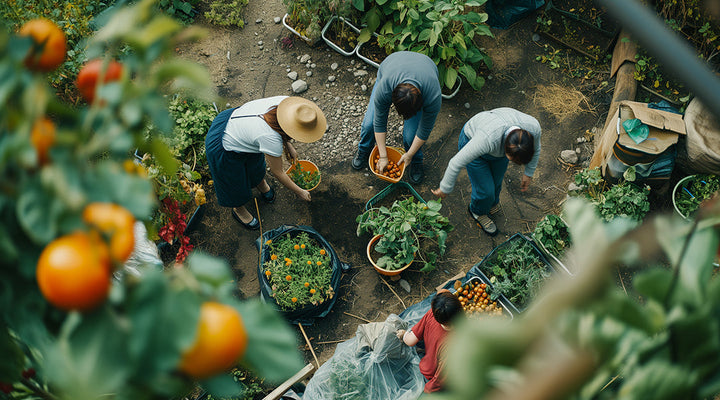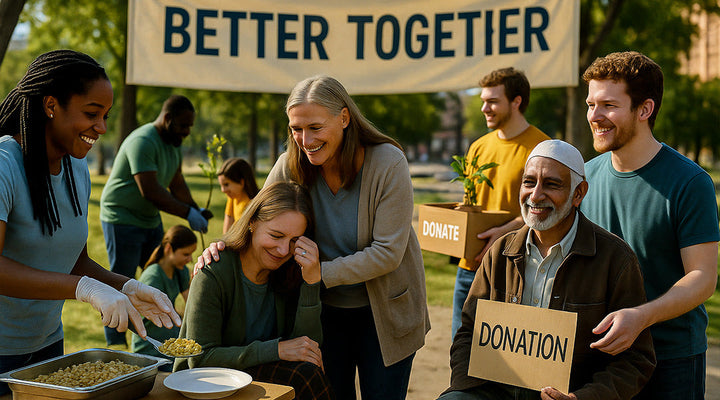
Sustainable Coffee - Benefiting Our Farmers, Our Planet, And You
Is your life, what you do each and every day, sustainable?
A common web search definition of sustainability is “the ability to be maintained at a certain rate or level.”
So, is what you’re putting into your body on a regular basis fueling it for years to come, or shortening your days?
Is the amount of sleep you get each night allowing your body to repair and recharge, or are you robbing your body of this needed reset in the name of Netflix?
To rephrase and repeat, are your most common life practices sustainable? Can you keep doing these things over a long period of time without harming your own life and the lives of those around you?
Right about now you’re probably thinking, what on earth does that line of questioning have to do with sustainably grown coffee?
Everything!
Most of us have heard of sustainability solely as it pertains to the environment. But, the impact of farming practices on the environment only scratches the surface of just how far reaching this concept truly is.
Yes, farming practices absolutely impact the environment in a monumental way, but those impacts touch each of our lives, whether we realize it or not.
Here we’d like to take a deep dive into the world of sustainably grown coffee, looking at how sustainable farming methods affect everything and everyone from our farmers, to the planet, and you!
What Is Sustainably Grown Coffee?

To best explain sustainable farming practices, let’s first take a look at common, or industrialized farming.
As populations grow, so does the demand for food.
And, since World War II, the demand for supply, efficiency, and safety in food production led to industrialized farming practices.
These practices can be explained most basically by the following mentality: we need to produce lots of food, so let’s think of the most quick and cost effective way to produce lots of it.
With words like cost-effective and the idea of providing food for hungry mouths, this sounds great.
But, there is/was really no thought for tomorrow in such practices.
What happens to rainforests when you clear out large areas of trees?
What happens to the climate when trees are cleared and then plants are used only until the soil needs a rest, necessitating then the clearing of more land?
What happens to the surrounding soil, water, air, and wildlife when massive amounts of chemicals are used to force plants to grow faster to accommodate mass market needs?
And, what happens to the health of the people consuming these goods when harsh chemicals are used in the growing process?
Sustainable farming not only provides an answer to that line of questioning, it negates it completely.
Industrial farming uses, expends, and consumes resources.
Sustainable farming contributes, regenerates, and co-exists.
Sustainable farming is a type of farming that can be maintained over a long period of time because it works with what’s been existing and thriving for centuries.
It works with the land by being grown amidst native flora and fauna in a region, negating deforestation and promoting biodiversity.
It omits the use of any chemical fertilizers or pesticides, protecting the soil, water supply in the region, wildlife, and the ecosystem at large.
In those few sentences alone, you can see how sustainable farming practices are better for the environment, but its benefits far surpass the earth.
So, from here forward, we’ll look at sustainable coffee growing practices to see how far those benefits reach.
Sustainable Coffee Benefits Our Farmers

By using sustainable farming practices, our coffee farmers have access to clean, healthy coffee.
And, by not using chemicals in the growing process, their communities as well as their ground and water supply, is clean and protected.
These are the seemingly obvious benefits of sustainable farming, but another product is fair wages.
A living wage is something that’s been somewhat of a hot topic in recent years here in America, with many families struggling to keep up with the bills that accumulate throughout a given month.
And, while we do understand and sympathize with those struggles, dare we say, we’re truly a blessed nation that may be a bit out of touch with the lives others live across the globe.
In some regions where coffee is grown, life looks very different from what we’re accustomed to in the US.
Take school for instance, we have the luxury to drive our children to bus stops so they don’t have to wait in the heat or the cold temperatures before boarding transportation that keeps them safe and dry on the way to a school day filled with learning, supplies, hot lunches, hygienic restrooms, medical care when needed, counselors, advisors, and more.
By way of contrast, in some coffee growing regions, children must walk an hour or more one way to school, on dangerous roads. Then, once at school:
- Supplies are often a luxury not afforded to students
- Unsafe structures, or those with open or leaking roofs, are common buildings used for schoolrooms
- Bathrooms aren’t always available, let alone proper hygiene items such as soap
It’s no wonder in many coffee growing regions a first grade education is considered to be a luxury.
This example (school life for children) alone paints a picture most of us are wholly unfamiliar with when compared to our lives here in America.
And, this is why sustainably grown coffee means the world to our farmers.
Broadly speaking, sustainable farming practices produce a crop with a much greater value than those which are mass marketed, meaning farmers using sustainable methods can make a better wage, bettering their families and communities.
Concerning Lifeboost, our coffee is single origin, specialty coffee. This combined with planet-friendly, sustainable, growing methods means our farmers produce a more valuable crop, worth a greater amount.
Sustainably farmed coffee also seeks to cut out the middleman, meaning farmers make a greater profit on their crop altogether.
Farmers using sustainable methods also commonly plant a variety of crops in the region, as opposed to the practice of deforestation which is common on large plantations. This yields a better paycheck for farmers and a more nutrient-dense coffee bean for consumers.
Farmers using sustainable methods also omit the use of chemical fertilizers and pesticides, letting nature care for the plants, which cuts down on cost as well as their physical exposure to these toxins.
Sustainable growing practices are also a beautiful sight to behold for farmers, seeing the benefits to the planet right before their eyes.
Sustainable Coffee Protects Our Planet

As we’ve briefly seen thus far, the difference in farming methods makes all the difference.
And, when it comes to growing coffee, the difference in sustainable farming practices could change the world!
Coffee is the world’s second most traded commodity, making it a cash crop.
And, since this cash crop is grown in tropical regions, those most noted for housing our world’s rainforests, it is estimated that for every cup of coffee consumed, a square inch of rainforest is destroyed.
In 2018 alone, over 2.9 million acres of tropical rainforests were destroyed, with large growing fields for industrialized farms accounting for roughly 80% of this deforestation.
You see, to keep up with demand, large coffee plantations clear acre after acre of rainforests to plant row after row of coffee shrubs.
Here, in the open sunlight, sprayed with pesticides and fertilizers, these plants grow at an accelerated rate to ensure supply meets the ever growing demand for this product.
The chemical build up in the soil and neighboring water supply then eventually necessitates that these plantations move to ground less tainted, more fertile. So, the process begins again, deforestation and devastation.
But, when coffee is grown sustainably, the quality of the soil in the area is preserved, even improved as plant diversity in the region grows, enriching the soil.
Less water is used in sustainably grown coffee as shrubs are grown on small plantations, negating the use or need for irrigation.
Soil, water, and air pollution are reduced when coffee is sustainably grown as rainwater quenches the thirst of plants, providing health and optimal growing conditions.
Pollinators thrive in areas where coffee is sustainably farmed, and the biodiversity of the region as a whole is enhanced.
Instead of robbing the region of fertile soil, clean water, plants, insects, birds, and other wildlife, these thrive amongst our coffee plants, essentially coexisting in a symbiotic relationship, each one providing benefit to the other.
In such a relationship, in sustainable coffee farming as a whole, our planet isn’t just preserved, it’s enriched!
And, this enrichment can extend to you as well!
Sustainable Coffee Benefits You

We just covered the alarming rate at which our rainforests are being depleted through the mass production of coffee, but unfortunately, environmental issues are often swept under the rug of the “out of sight, out of mind” mentality.
We’re all guilty as I’m sure no one can say they think about this issue morning, noon, and night.
But, what you do think about without fail is yourself, we all do.
And, that doesn’t mean we’re selfish, it just means we’re most acquainted with our being, our person, our bodies. Because, well, we’re with our body 24/7.
The thing is, sustainable farming greatly affects your body!
Coffee can be an incredible source of health. It contains caffeine and antioxidants, known to reduce inflammation and prevent disease.
Coffee has been proven to boost energy, aid in weight management, lower the risk of depression, even improve heart health, and protect against liver disease and damage.
But, drinking just any coffee can create a conundrum.
If you drink coffee grown on mass market coffee farms, you are likely consuming molds and the toxins they produce as they multiply in adverse growing conditions.
Ochratoxin A and Aflatoxins A and B1 are both common toxins found in coffee linked to numerous cancers.

Heavy metals, specifically cadmium and lead, are also commonly found in mass produced coffee, and both of these have proven to be toxic to liver health.
Heavy metals also interfere with the health benefits of the polyphenol content of coffee, diminishing the disease prevention power of your brew.
Glyphosate, an herbicide (also known as Roundup) commonly used on large coffee plantations to curb weed growth was found in the urine samples of 93% of Americans. This chemical is highly linked to non-alcoholic fatty liver disease, cancer, kidney damage, reproductive and fertility issues, and more.
Pesticides and fertilizers used on mass market coffee farms also lead to health problems for consumers, with these proven to cause liver cancer, kidney dysfunction, neurological disorders, birth defects, and much more.
Sustainably grown coffee, however, poses none of these risks. In fact, sustainably grown coffee boosts the health benefits of coffee altogether!
Lifeboost coffee is sustainably grown at high altitudes, gaining the benefit of pure rainwater falling fresh on the plants, yet this elevation also provides needed drainage, preventing molds and toxins from forming on the plants.
Through sustainable farming practices, no chemicals are used to keep pests away as insects provide pollination while native birds feast on the pests to keep their population balanced, preventing harm to the coffee plants.
Instead of clearing forested areas, sustainable coffee is grown with plants in the region to gain shade.
And, by growing coffee plants under this canopy of shade, the temperatures are kept cool, causing the plants to mature at a slower rate.
Slow maturation, combined with diverse plant and animal life thriving in the region means a more nutrient dense coffee bean, the soil enriched from the decomposing leaves falling nearby and the animal waste naturally occurring in the area.
When I think of industrialized coffee growing methods versus sustainably farmed coffee, I see two very different pictures regarding our health:
With mass produced coffee, I see a bleak picture, one with disease and destruction.
And, with sustainable coffee, I see a picture of harmony.
The plants grow in harmony with nature, creating and preserving biodiversity. And, our bodies live in harmony with naturally grown coffee, resulting in our reaping the rewards of better taste, more nutrients, health, and well being.
Now that’s a beautiful picture!
Recap

What a beautiful picture indeed, seeing the benefits of sustainably farmed coffee reaching from the environment, to our farmers, even our own health!
So then, we’d like to close out this article the same way we started it, with a few questions for you to ponder…
Is the coffee you’re drinking sustainable?
Can you maintain your coffee drinking practices for a long time, knowing they’re contributing to your health and wellbeing?
Is the coffee you’re drinking potentially filled with toxins that adversely affect your health with each sip?
Is the way your preferred brew is grown causing the deforestation of acre after acre of precious rainforest?
Does growing your coffee destroy habitats for endangered species?
Is your coffee grown with the incorporation of harmful chemicals, polluting soil, waterways, wildlife populations, and you as you consume it?
Can the methods incorporated in the growing of your coffee be used for years to come, or will those methods rob the planet of future years?
And, what about the farmers that grow your coffee? Do they make a living wage? Are the communities where they live flourishing, or are they stuck in cycles of poverty?
These are questions Lifeboost thinks about with every relationship we build with our farmers.
These are questions Lifeboost thinks about with every coffee shrub planted, every ripe coffee cherry selected by hand, every bean processed, tested, and roasted.
These are questions we think about with every sip of coffee we take.
And, this is why we do what we do here at Lifeboost.
For our farmers. For our planet. For our health. For your health.
This is why Lifeboost coffee…
- Pays our farmers a fair wage
- Supports organizations, like Project Alianza, that build schools within the communities where our farmers live
- Supports organizations that protect the land and wildlife in the areas where our coffee is grown
- Uses shipping services, like Ecocart, that offset our carbon footprint
- Is grown on small plantations amidst native plants and wildlife without practicing deforestation or using harsh chemicals like fertilizers, herbicides, and pesticides
- Is grown at high elevations to further negate the use of chemicals in the growing process
- Is 3rd party tested for molds, mycotoxins, heavy metals, and 400+ other chemicals
…is a coffee we happily grow, process, and enjoy, sustainably!
Disclaimer: Beginning in 2025, Lifeboost Coffee primarily sources our coffee from farms in Honduras. Our practices of fair wages, sustainable growing methods-from shade to zero chemicals-all are still a part of our operations and are key to what makes our coffee health, delicious, and ethical. Only our farming locations have changed so that we can continue these ethical practices while also meeting our customer demands.
- https://greentumble.com/10-sustainable-farming-methods-and-practices/
- https://ohiostate.pressbooks.pub/sciencebites/chapter/a-bitter-brew-coffee-production-deforestation-soil-erosion-and-water-contamination/
- https://www.rainforesttrust.org/our-impact/rainforest-news/devastating-truths-of-deforestation-and-how-you-can-help/
- https://foodprint.org/issues/sustainable-agriculture-vs-industrial-agriculture/#
- https://www.nationalgeographic.org/activity/ecological-relationships/#
- https://www.conserve-energy-future.com/know-about-coffee-beans-and-sustainable-coffee-farming.php
- https://www.hopkinsmedicine.org/health/wellness-and-prevention/9-reasons-why-the-right-amount-of-coffee-is-good-for-you#:
- https://www.healthline.com/nutrition/top-evidence-based-health-benefits-of-coffee
- https://pubmed.ncbi.nlm.nih.gov/7759018/
- https://drruscio.com/mycotoxins-in-coffee/
- https://www.ncbi.nlm.nih.gov/pmc/articles/PMC3945755/
- https://www.ncbi.nlm.nih.gov/pmc/articles/PMC8226649/
- https://www.webmd.com/cancer/herbicide-glyphosate-cancer
- https://livingmaxwell.com/93-percent-americans-glyphosate-urine
- https://www.pesticidereform.org/pesticides-human-health/#
- References for the article to confirm data and information.










